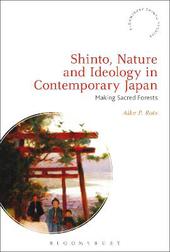
|
Shinto, Nature and Ideology in Contemporary Japan: Making Sacred Forests
Hardback
Main Details
| Title |
Shinto, Nature and Ideology in Contemporary Japan: Making Sacred Forests
|
| Authors and Contributors |
By (author) Aike P. Rots
|
| Series | Bloomsbury Shinto Studies |
|---|
| Physical Properties |
| Format:Hardback | | Pages:272 | | Dimensions(mm): Height 234,Width 156 |
|
| Category/Genre | Shintoism
Worship, rites and ceremonies |
|---|
| ISBN/Barcode |
9781474289931
|
| Classifications | Dewey:299.56135 |
|---|
| Audience | | Tertiary Education (US: College) | |
|---|
| Illustrations |
20 bw illus
|
|
Publishing Details |
| Publisher |
Bloomsbury Publishing PLC
|
| Imprint |
Bloomsbury Academic
|
| Publication Date |
7 September 2017 |
| Publication Country |
United Kingdom
|
Description
Shinto, Nature and Ideology in Contemporary Japan is the first systematic study of Shinto's environmental turn. The book traces the development in recent decades of the idea of Shinto as an 'ancient nature religion,' and a resource for overcoming environmental problems. The volume shows how these ideas gradually achieved popularity among scientists, priests, Shinto-related new religious movements and, eventually, the conservative shrine establishment. Aike P. Rots argues that central to this development is the notion of chinju no mori: the sacred groves surrounding many Shinto shrines. Although initially used to refer to remaining areas of primary or secondary forest, today the term has come to be extended to any sort of shrine land, signifying not only historical and ecological continuity but also abstract values such as community spirit, patriotism and traditional culture. The book shows how Shinto's environmental turn has also provided legitimacy internationally: influenced by the global discourse on religion and ecology, in recent years the Shinto establishment has actively engaged with international organizations devoted to the conservation of sacred sites. Shinto sacred forests thus carry significance locally as well as nationally and internationally, and figure prominently in attempts to reposition Shinto in the centre of public space.
Author Biography
Aike P. Rots is Associate Professor of Contemporary Japanese Culture at the University of Oslo, Norway.
ReviewsA nuanced study that is historically informed while remaining timely ... Rots' prose is clear, his attention to detail, history, and nuance replete, and his interventions timely. Shinto, Nature and Ideology in Contemporary Japan is a trans-disciplinary work that sheds light on subject matter often mischaracterized by scholars without the proper background. * Journal of Religion in Japan * A significant and valuable contribution to the fields of religious studies, Japanese studies, Shinto studies, and Asian studies generally ... [It] provides the kind of thorough, fair, and at times sharply critical expose of contentious issues pulsing through current shrine Shinto and Japanese nationalism. * Contemporary Japan * Provides an insightful approach to understanding Shinto's discursive profile in contemporary Japan ... Effectively combining discourse analysis with ethnographic field work, Rots argues that Shinto has shed its strong association with prewar militarism by embracing conceptions of "nature" and "environmental sustainability." * Journal of Japanese Studies * [T]his book does full justice to its title and succeeds in presenting the first systematic and exhaustive study not only to discuss the Shinto environmentalist paradigm as an intellectual object but also to trace its concrete development in contemporary Japan. Through his focus on sacred shrine forests, Rots provides a finely nuanced portrait of the ecological discourses and practices produced by a wide range of individuals and organizations related to the Shinto world. * Monumenta Nipponica * [W]ell researched, highly informative, and thought provoking. * Asian Ethnology * A comprehensive overview ... [Aike P. Rots] focuses not only on what these paradigms say but also what they leave out, and how they relate to actual practices and campaigns at the local and national levels. He is generous with his sources but pays attention to the distance between their rhetoric and reality. * Reading Religion * The book does a great service for acknowledging religion's crucial role in our thinking and caring about the environment. Warmly recommended. * Religious Studies Review * Shinto's latest iteration as a "green religion" is critically examined in this timely volume. Is the new environmental paradigm a rebranding strategy aimed at gaining legitimacy? Can Shinto activism expand beyond local preservation activities to engage national and global issues? How is it related to the imperial-ethnic paradigms, which define the Shinto establishment's neonationalistic political agenda? These questions and more are seriously engaged here. * Mark R. Mullins, Professor of Japanese Studies, University of Auckland, New Zealand * In this illuminating book, Aike Rots critically analyses the much-vaunted image of Shinto as a 'nature religion' promoting environmentalism, showing that Shinto environmentalism is infused with themes of nationalism and full of ambiguities. As he demonstrates, Shinto 'sacred forests' that are depicted as manifestations of the natural world may be highly manufactured, while the shrines that promote them may take sponsorship from businesses involved in environmentally-damaging activities. * Ian Reader, Professor Emeritus, The University of Manchester, UK * This well-researched analysis of the "Shinto environmentalist paradigm" centred on "sacred forests" (chinju no mori) makes an important and timely contribution to the study of religion in Japan and to current debates regarding Shinto ideology. * Erica Baffelli, Senior Lecturer in Japanese Studies, University of Manchester, UK *
|